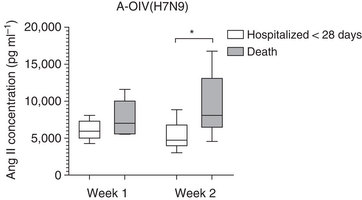科学家发现H7N9患者重症化标志物
来源:《自然—通讯》
作者:李兰娟等
时间:2014-06-06

浙江大学医学院附属第一医院和中国医学科学院的科研人员最新研究发现,存在于血浆中的一种调节肽——血浆血管紧张素II与H7N9患者疾病的严重程度及病死率高度相关,如果这一指标升高,病死率明显增加。该研究表明,血管紧张素II是禽流感的生物标志物,可用于临床作为患者重症化的预警指标,预测H7N9患者疾病严重程度及预后。相关研究成果发表于5月6日出版的《自然—通讯》。
今年以来,H7N9禽流感不断发生。病毒引起严重的疾病,包括急性甚至致命的呼吸衰竭,对于不同的感染者呈现不同的预后。究竟有没有一种标志物,可以用来判断H7N9患者疾病严重程度及预后?
该论文通讯作者,中国工程院院士、浙江大学医学院附属第一医院传染病诊治国家重点实验室感染性疾病诊治协同创新中心主任李兰娟介绍说,研究发现,与C反应蛋白、氧合指数等指标相比,血管紧张素II的预测“准确度”更高,敏感性和特异性分别为87.5%和68%。
发现风险、识别身份、阐明机制/阻断传播、寻找有效疗法等一系列措施的迅速落实,是人类控制疾病的关键。李兰娟介绍,从去年介入H7N9禽流感研究以来,研究团队分别进行了病毒溯源、病原体分离鉴定、发病机制研究、患者病理改变研究、患者临床特征研究、人工肝救治严重呼吸衰竭研究、疫苗株研发等一系列工作。她表示,其团队还将继续密切关注H7N9等禽流感病毒的变异及流行动向,对发病机制、以人工肝为主的H7N9重症病例的支持治疗机制、抗病毒药物耐药及疫苗临床试验等进行研究。(来源:中国科学报 钟华)
Angiotensin II plasma levels are linked to disease severity and predict fatal outcomes
in H7N9-infected patients
Abstract A novel influenza A (H7N9) virus of avian origin emerged in eastern China in the spring of 2013. This virus causes severe disease in humans, including acute and often lethal respiratory failure. As of January 2014, 275 cases of H7N9-infected patients had been reported, highlighting the urgency of identifying biomarkers for predicting disease severity and fatal outcomes. Here, we show that plasma levels of angiotensin II, a major regulatory peptide of the renin–angiotensin system, are markedly elevated in H7N9 patients and are associated with disease progression. Moreover, the sustained high levels of angiotensin II in these patients are strongly correlated with mortality. The predictive value of angiotensin II is higher than that of C-reactive protein and some clinical parameters such as the PaO2/FiO2 ratio (partial pressure of arterial oxygen to the fraction of inspired oxygen). Our findings indicate that angiotensin II is a biomarker for lethality in flu infections.
原文链接:http://www.nature.com/ncomms/2014/140506/ncomms4595/full/ncomms4595.html




